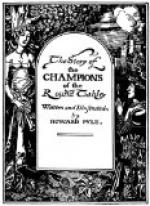Then King Angus said: “If that is so, how is it that I find thee here armed as if for battle, with thy sword in thy hand?” “Lord,” said Sir Tristram, “although I be friends with you and yours, yet I know not whether you be friends or enemies unto me; wherefore I have prepared myself so that I may see what is your will with me, for I will not have you slay me without defence upon my part.” Then King Angus said: “Thou speakest in a very foolish way, for how could a single knight hope to defend himself against my whole household? Now I bid thee tell me who thou art, and what is thy name, and why thou earnest hither knowing that thou hadst slain my brother?”
[Sidenote: Sir Tristram confesses to King Angus] Then Sir Tristram said, “Lord, I will tell thee all the truth.” And therewith he confessed everything to King Angus, to wit: who was his father and his mother, and how he was born and reared; how he fought Sir Marhaus, and for what reason; and of how he came hither to be healed of his wound, from which else he must die in very grievous pain. And he said: “All this is truth, Lord, and it is truth that I had no ill-will against Sir Marhaus; for I only stood to do battle with him for the sake of mine uncle, King Mark of Cornwall, and to enhance mine own honor; and I took my fortune with him as he took his with me. Moreover, I fought with Sir Marhaus upon the same day that I was made knight, and that was the first battle which I fought, and in that battle I was wounded so sorely that I was like to die as you very well know. As for him, he was a knight well-tried and seasoned with many battles, and he suffered by no treachery but only with the fortune of war.”
So King Angus listened to all that Sir Tristram said, and when he had ended, quoth he: “As God sees me, Tristram, I cannot deny that you did with Sir Marhaus as a true knight should. For it was certes your part to take the cause of your uncle upon you if you had the heart to do so, and it was truly a real knightly thing for you who were so young to seek honor at the hands of so famous a knight as Sir Marhaus. For I do not believe that until you came his way there was any knight in the world who was greater than he, unless it were Sir Launcelot of the Lake. Wherefore, from that, and from what I saw you do at the tournament, some time ago, I believe that you are one of the strongest knights in the world, and the peer of Sir Launcelot, or of anybody else.
“But though all this is true, nevertheless it will not be possible for me to maintain you in this country, for if I keep you here I shall greatly displease not only the Queen and her kin, but many of those lords and knights who were kin to Sir Marhaus or who were united to him in pledges of friendship. So you must even save yourself as you can and leave here straightway, for I may not help or aid you in any way.”




